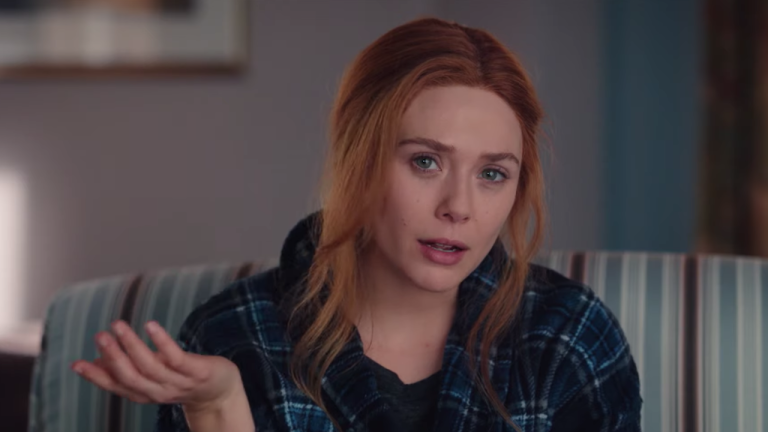The Subversive Sitcom
As Britney Jean Spears once said: Gimme More!
Elizabeth Olsen plays Wanda Maximoff in WandaVision.
I grew up on sitcoms. I don’t think it would be fair to my mom to say they raised me, but I’m an only child of divorced parents, so fantasizing alternate realities has always been my jam. I would get off the bus, get some snacks and exist in perfect solitude for two hours until I heard my mom’s car in the driveway, sigh and pretend I’d been doing my homework the whole time.
(An important note: I never saw any of these sitcoms live. If it wasn’t a re-run after school or The George Lopez Show on Nick at Nite, it didn’t hit for me!)
If I wasn’t dreaming of the perfectly imperfect family, I was dreaming of what my life would be like if I had a group of funny, iconic, stylish friends (except not as white or actually as boring as Friends actually was) living flawed but full lives. Living Single, Fresh Prince of Bel-Air and Girlfriends permeated my consciousness way before I should have been allowed to watch them, but I drank up everything each show was willing to give me.
I can trace my life through the sitcoms that came on throughout the day, but the sitcom can trace its beginnings to radio in the early 20th century, and it’s been around consistently ever since. While many folks don’t like sitcoms or find them corny (you’re not wrong tbh), I’ve always thought sitcoms represented just a little bit more than superficial jokes and bad tropes.
Sitcoms are a withstanding part of American culture for a reason. They’re maintained and sustained by almighty gatekeepers – teachers, parents, religion, our community. I’ve always seen culture as creating new trends and paths to understanding while simultaneously holding a mirror to our own habits, societal norms and boundaries. What makes sense to us in a “proper society?”
Sitcoms have had to change to keep up with new trends and ever changing aspects of culture, but despite their pervasive nature, the scripted 30-minute sitcom we know today is succinct and almost formulaic. You can track down the general components of a sitcom generally down to the minute they’re supposed to happen. Even in more age appropriate sitcoms that my mom actually let me watch (That’s So Raven, Suite Life of Zack & Cody, Wizards of Waverly Place...you get the vibes), you have an understanding of the unspoken rules that keep the shows both entertaining and functional.
A few core tenets of the sitcom: a character’s general sense of style, their personality, and the tv set all remain the same, no change necessary. And the wonderful part about sitcoms is that we largely don’t care if they do. Despite whatever obstacles face them in those 22 minutes, you can guarantee that the characters will find resolution by the end of the episode. Our faves wouldn’t be our faves without their significant flaws coupled with the unspoken promise there will be more problems to resolve in the next episode.
But what if the main characters’ physical and emotional volatility changed in every episode? What if they’re painstakingly aware that their reality doesn’t match what they’ve always dreamed of?
The trailer for WandaVision only gives us small foreshadowing of what’s to come. Wanda (perhaps better known as “Scarlet Witch,” even though she’s never been named as such in the Marvel Cinematic Universe until this show) and Vision living blissful lives in the fictional city of Westview after the events of Avengers: Endgame.
*Some spoilers below if you haven’t seen any Marvel movies from the past decade...if that’s the case, I’m so happy you woke up and chose peace for your life*
Now if you know anything about these movies you know Vision got got by Thanos not once, but TWICE, so he’s supposed to be good and de*d by now. But what you don’t know is what’s going on and who’s behind it all.
Wanda and Vision go back and forth hiding their abilities from neighbors and co-workers alike, moving seamlessly throughout television eras inspired by beloved heavyweights of the sitcom genre (The Dick Van Dyke Show, The Brady Bunch, Bewitched etc. etc. In a later episode in the show you get to see an uncanny Julie Bowen impression from Elizabeth Olsen, it’s really a gem moment.)
The clear warmth Wanda and Vision feel for each other is so palpable that even people who haven’t seen every Avengers film (but enjoy sitcoms) will want to watch. I believe people would’ve watched the show for their own curiosity’s sake, but the well-timed jokes, the accompanying laugh track and all the “quirky” side characters (good morning to Kathryn Hahn and Kathryn Hahn only) come together to give you little glimpses into a romance that wasn’t allowed the spotlight in Avengers. But as the trailer for WandaVision implies, all is not what it seems in Westview.
I’ve seen a lot of people online say they didn’t get into the show until after the first few episodes, but being a lover of the sitcom really came through for me. With sitcoms, you know when it’s wrong: the timing is slightly off, an adventure or a wild task’s been rushed, a character’s gone off script, the magic is gone. The premise of sitcoms relies on the notion that questions will be asked and answered in 30 minutes, and the family will love each other more than ever, no mistakes. When you’re left with more questions than answers and characters have unsettling, imperfect responses, you know something’s about to go left.
In sitcoms, when a character steps outside of their comfort zone because of a problem, they more often than not decide never to do whatever that was again. It’s unfamiliar and unsettling to the audience, we want growth but not too much too fast. It begs the question: what happens when one person dares to step out of their role? At least in American sitcoms, the short answer: the entire story and its believability falls apart. You start seeing the depth of characters’ pain, and what’s more American than tragedy and despair? For WandaVision, the best parts of this story are contrasting the little peace that characters have and the unraveling of the story.
I won’t spoil WandaVision more than that, but I’m honestly so thrilled for people to take this concept even further in the next few years. While it hasn’t come out yet, I can’t help but notice another twisted take on the sitcom coming up: Kevin Can F**k Himself.
Annie Murphy plays Allison in Kevin Can F**k Himself.
Annie Murphy (our beloved Alexis Rose from Schitt’s Creek) plays Allison in the show, a traditional sitcom wife who clearly despises her husband Kevin. In the trailer you’ll see Allison is clearly miserable, the butt of Kevin’s busted jokes, and subjected to a mocking laugh track that only seems to play when he and his friends openly resent her.
More often than not, the role of the sitcom wife is to be a nuisance to their husband, nag and be responsible for all food preparation (whether they can cook well, or can’t cook, somehow they’re still the butt of the joke).
I’m of the opinion that women are the backbone of literally every sitcom. I said what I said. The sitcom wife literally carries their entire marriage, is the only one sensible enough to give their children normal advice, and the only one that seems to be able to turn on the oven in that thiccc kitchen...regardless of which domestic chore she’s tasked with, the sitcom wife still manages to carry this genre on their fucking BACK. I find I’m *particularly* homicidal when they have to put up with all this domestic and emotional labor on top of an ungrateful, downright disrespectful husband :-)
But the trailer for Kevin Can F*** Himself gives us another reality, a taste of the good life: what if sitcom wives were allowed to choose themselves, choose a life that doesn’t revolve around their husband, choose revenge?
*whispers* What if Allison just k****d her husband?
We’ll just have to watch and see!
If you’re scared of the direction that sitcoms are going, no need to fear: there will always be sitcoms that play it safe and stay family friendly. I grew up on sitcoms from every decade in the past half a century and look how I turned out! *grimace*
Personally, my hope is that more writers and directors will take the chance to break away from the constraints of the genre, because WandaVision (and the sheer potential of Annie Murphy playing a funny woman scorned) has opened my eyes to a world of possibilities.
Come on Hollywood, give us something! We’re (mostly me) waiting!


